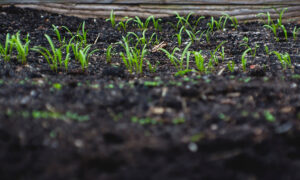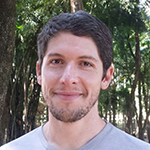By George Brown, Wilian Demetrio y Alessandro Samuel-Rosa

Image: Markus Spiske.
Those working with environmental sciences such as Soil Science know that this métier involves the assessment of multiple descriptive and explanatory environmental variables. The aim is to understand the complex phenomena that occur in nature, whether working in the field or in the laboratory, or even with their derivatives, such as micro, meso or macrobiota. Thus, our research generally generates huge data sheets, with results of several variables, many of them measured over time. These are often analyzed using complex statistical methods in order to find and explore the relationships between variables and their significance. Among these methods, multivariate analysis has become indispensable since it is very useful for revealing these relationships in a visually understandable manner.
However, a limitation of almost all the research work in Soil Science carried out in Brazil is the lack of access to the primary data used in statistical analysis. It prevents data from being reused, either to reproduce a study and verify its conclusions or to carry out further research to answer questions that have remained unanswered.
Often, the data is presented only in an aggregated form in tables with descriptive statistics of the variables studied.One of the uses of aggregated data is to carry out synthesis studies based on meta-analytical tools, which have been gaining ground in Soil Science. These studies identify trends and behavior patterns of data produced in many works on a given subject, especially those whose results show high variability. However, with the increasing use of multivariate statistical methods, even this aggregated version of the data has been omitted in publications. In these cases, it has been the authors’ and editors’ usual preferences to present data in the form of figures and tables, result of the multivariate analysis. This type of practice harms even the meta-analysis studies, which makes these research works an end point in the data’s life span.
As scientists, we are concerned with sustainability in advancing knowledge. By adopting a policy focused on making primary data available, we will increase our research future usefulness and the collaboration between researchers.
Open data policies have been adopted by many scientific journals abroad, which increasingly require that primary data be, at a minimum, made available as supplementary material for publications, or that authors inform where it has been deposited, whether that’s in data repositories or as metadata. However, the most efficient and appropriate practice is to deposit research data in specialized public trustworthy repositories for this purpose which, besides digital preservation, require structuring and adequate description of metadata, assign a DOI (Digital Object Identifier) thus providing the data with greater sustainability and visibility, since it’s indexed in online searchable databases. Ideally, data will be organized and made available according to the FAIR principles, Findable, Accessible, Interoperable, Reusable, which apply especially to computerized access.
Most of the research in Soil Science developed in Brazil is financed by public agencies or with public resources, granted by agencies that promote research in graduate courses such as CNPq (Conselho Nacional de Desenvolvimento Científico e Tecnológico, National Council for Scientific and Technological Development) and CAPES (Coordenação de Aperfeiçoamento de Pessoal de Nível Superior, Coordination for the Improvement of Higher Education Personnel), and the state research foundations. Moreover, the salaries of public servants and employees, who generate most of the results of science in our country, are also financed with public resources. Therefore, we need to understand that the open availability of research data, along with the publications they have generated, is a matter of science sustainability and accountability to society in general. Of course, with due attention to institutional policies on making data available and protecting sensitive knowledge. Always keeping in mind, the “as open as possible and as closed as necessary” rule.
The open availability of data is already required by international funding agencies such as the European Union and the UK Research Councils, which reinforce the requirement for data submission as supplementary material by scientific journals, as previously mentioned. Soon, Brazilian research institutes will also demand it. CNPq, in partnership with Ibict (Instituto Brasileiro de Informação em Ciência e Tecnologia, Brazilian Institute of Information in Science and Technology), is already developing the Lattes Data repository to store data on projects promoted by the agency. In the FAPESP’s (Fundação de Amparo à Pesquisa do Estado de São Paulo, São Paulo State Research Support Foundation) case, some calls for proposals require the submission of a data management plan accompanying the research proposal. The SciELO program is also developing a repository, SciELO Data, to store data linked to manuscripts submitted to SciELO network journals.
However, it would be more recommendable if, as a scientific society and as scientists, we adopt an open data policy geared to the specificities and priorities of each area, instead of expecting for a requirement from funding agencies or scientific journals. Thus, we got ahead in the process and showed our goodwill towards Brazilian society, which, through taxes, has been financing our jobs, students and research for decades.
In an increasingly globalized world, in which large data syntheses often cause a great deal of fanfare, adopting a more open science will also increase the possibility of reuse, utilization and reanalysis of research data and, therefore, its sustainability, visibility and impact.
Bulletin 45 (1) of the Brazilian Society of Soil Science1 (Sociedade Brasileira de Ciência do Solo) presented a wide discussion on open science and the main national and international public repositories of open soil data. However, since then, there seems to have been no progress in data opening on soil science research in Brazil. Major journals in the field still do not require the submission of data as supplementary material or that it’s made available in public repositories. Moreover, master’s, doctoral and post-doctoral students from the main graduate programs and research institutions in the area still do not need to develop plans for open management of the data produced.
The development of models for organizing and storing data that facilitate availability, transfer, and reuse with minimal human effort, has been occurring only in a punctual and poorly articulated manner. It is essential to resume this discussion, aiming at increasing the openness of Brazilian Soil Science. We believe that the most efficient way to foster this discussion, in a structured and coordinated way, is to form a working group with the Brazilian Society of Soil Science (Sociedade Brasileira de Ciência do Solo). A working group that brings together researchers from different areas of Soil Science to idealize sustainable solutions for the data generated in our research.
Science has been increasingly demanded, and at the same time criticized and scrutinized by society and governments, which seek solutions to current problems, or sometimes justifications for their actions. By adopting an open science policy, with open availability of primary data and research results, we demonstrate that we have nothing to hide, and that the data is free for anyone to use it. Obviously, this involves certain risks, as the data can also be used freely by interest groups with their own agendas.
As scientists, we take care of data, and make proper use of it, in our publications. Therefore, it is necessary to build, as a scientific society, concomitantly with the potential data users, guidelines for responsible use that include, for example, citing the original sources and adopting criteria for the context, interpretation, and use of open data. These guidelines could be made available together with the data files, in trusted data repositories. Clearly, there are many benefits, but also possible pitfalls to be avoided in the process of opening research data, and these issues deserve further discussion, aiming at a better understanding of the scientific opening process to which we are exposed and for which we need to prepare.
Note
1. Os Desafios da Open Science para a Ciência do Solo. Boletim Informativo da Sociedade Brasileira de Ciência do Solo [online]. 2019, vol. 45, no.1, ISSN: 1981-979X [viewed 8 January 2020]. Available from: https://www.sbcs.org.br/wp-content/uploads/2019/06/Boletim-SBCS-Volume-45-N%C3%BAmero-1.pdf
References
CNPq e IBICT lançam Lattes Data [online]. Governo Federal – Governo do Brasil. 2020 [viewed 8 January 2020]. Available from: https://www.gov.br/cgu/pt-br/governo-aberto/noticias/2020/2/cnpq-e-ibict-lancam-lattes-data
Launch of the SciELO Data repository [online]. SciELO.org. 2020 [viewed 8 January 2020]. Available from: https://mailchi.mp/scielo/scielo-data-en
Os Desafios da Open Science para a Ciência do Solo. Boletim Informativo da Sociedade Brasileira de Ciência do Solo [online]. 2019, vol. 45, no.1, ISSN: 1981-979X [viewed 8 January 2020]. Available from: https://www.sbcs.org.br/wp-content/uploads/2019/06/Boletim-SBCS-Volume-45-N%C3%BAmero-1.pdf
WILKINSON, M.D., et al. The FAIR Guiding Principles for scientific data management and stewardship. Sci Data [online]. 2016, vol. 3, no 1, 160018 [viewed 8 January 2020]. http://doi.org/10.1038/sdata.2016.18. Available from: https://www.nature.com/articles/sdata201618
External links
Gestão de dados – FAPESP: https://fapesp.br/gestaodedados
Repositório Brasileiro Livre para Dados Abertos do Solo: https://www.pedometria.org/febr/
SciELO Data: https://data.scielo.org/
Sociedade Brasileira de Ciência do Solo (SBCS): https://www.sbcs.org.br/
About George Brown
George Brown is a researcher at Embrapa Florestas and professor of graduate studies in Soil Science at the Federal University of Paraná. He holds a degree in Natural Sciences at the University of Wisconsin, and a doctorate in Ecology at the University of Paris. He works in soil ecology, using animals as bioindicators of environmental quality, and is one of the few earthworm specialists in Brazil. He edited several books and published more than 100 papers in scientific journals, interacting with hundreds of professionals in Brazil and abroad.
About Wilian Demetrio
Wilian Demetrio is a postdoctoral fellow at the National Institute for Special Research (Inpe). He holds a degree in Agronomy from Uniguaçu, with a master’s and doctorate in Soil Science from the Federal University of Paraná. His area of study and interest is soil ecology, with the use of invertebrates, with an emphasis on earthworms, as indicators of soil quality.
About Alessandro Samuel-Rosa
Alessandro Samuel-Rosa is a professor of soil classification and mapping, applied statistics and probability, and geoprocessing and remote sensing at the Federal Technological University of Paraná. His research interests include optimization of sample configurations, (geo)statistical models and machine learning, and data standardization and harmonization. He is the leader of the Pedometry Laboratory, which develops the pedometrics, spsann, and febr packages for R, and maintains the Repositório Brasileiro Livre para Dados Abertos do Solo.
Translated from the original in Portuguese by Lilian Nassi-Calò.
Como citar este post [ISO 690/2010]:

















Recent Comments